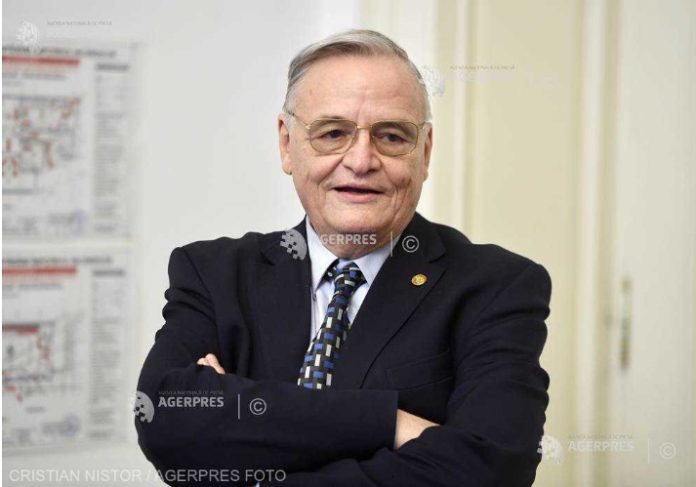Article published by Agerpres
The project “Romania of Knowledge”, dedicated to the development of the country through education, science, research and technology, vectors of progress and evolution of the economy, society and civilization, was launched on Tuesday by the Romanian Academy of Scientists, the National University of Science and Technology “Politehnica” Bucharest and the University of Medicine and Pharmacy “Carol Davila” Bucharest, in the hall of the Central University Library “Carol I”.
The President of the Romanian Academy of Scientists, Professor Adrian Badea, said that the initiative is addressed to decision-makers from whom he expects feedback.
“We want this national project to be different from other scientific projects, which aim to organise national and international scientific conferences on specific issues. Knowing that in any country in the world, decisions are made not by scientists but by politicians, we thought that this project would address politicians on some of Romania’s current issues, because it is a project for Romania. But we also want the reverse link, that is, when they have problems, decisions to make, they should address this project”, said Badea.
He pointed out that within 10 days of the announcement of the project more than 35 institutions had joined as partners, starting with the Ministries of Education, Research, Innovation and Digitisation.
“We want to offer free, non-partisan expertise to the Government, Parliament, local government, companies and especially SMEs, because none of us has any political bias, we just want to be heard. Of course, we present a point of view. They make the decisions, because that is normal in any country in the world. We hope it will be a successful project,” added the president of the AOSR.
The Rector of the National University of Science and Technology Politehnica Bucharest, Professor Mihnea Costoiu, welcomed the AOSR initiative and pointed out that it aims to alleviate many imbalances faced by Romania.
“Romania is in a major demographic decline, there is also a major economic impact due to the lack of qualified human resources. And we want to draw attention to this in the long term. There is a major impact on state decisions and we want to bring together important actors, the bright minds of society, obviously the Romanian Academy and so on, to create a long-term project. It is a project that will not end today,” said Costoiu.
He added that, as time goes by, the initiators of the project want “to put in front of society more data, collected from open sources, from public data, projects, studies made by different international or national bodies”, with which to base the proposals for solutions they will have in society in the coming period.
Mihnea Costoiu stressed that the “Romania of Knowledge” initiative has no political connotation. “I insist very much, I would not want any political connotation to be given to this event. Under no circumstances,” Costoiu said.
According to rankings covering global knowledge indices such as pre-university education, technological education, higher education, research and development, telecommunications and information technology, economy, Romania “does not rank well enough”, pointed out the rector of the University of Medicine and Pharmacy “Carol Davila” Bucharest, Professor Viorel Jinga.
The State Counsellor in the Prime Minister’s Chancellery Andrei-Ion Ungar sent a message on behalf of Prime Minister Marcel Ciolacu, in which the Prime Minister appreciates that the “Romania of Knowledge” project represents “a benchmark of the future vision of the Romanian academic world”.
“This project is not just an initiative, it is meant to be a vision, a vision for a country where education, research and innovation must be the engine of progress and prosperity, a vision for a society where knowledge must be valued and excellence encouraged in all areas of our lives. The key areas on which this project focuses are the pillars on which a better future for all our citizens can be built. Education, health, technology, the environment, spirituality, culture and more will be the main topics of debate and joint actions of this project. Through the collaboration between the three academic institutions and our common commitment, we are determined to bring positive and sustainable changes in the lives of all Romanians”, said Marcel Ciolacu.
At the event, opened by BCU Director General Mireille Rădoi, other speakers included AOSR Vice-President Doina Banciu, Senate Vice-President Sorin Cîmpeanu, representatives of ministries and universities, and researchers.
According to the initiators, the “Romania of Knowledge” project aims to create a national framework for debate, a think-tank that brings together representative personalities from each field involved, from the country and abroad, scientists, researchers, members of the academic body, experts and specialists, decision-makers and policy-makers.
This forum will address fundamental areas and themes for the process of sustainable development of Romania through knowledge.
The thematic areas and coordinates on which the “Romania of Knowledge” project is structured are: Education; Research, Innovation; Communications, Information Technology and Artificial Intelligence; Efficient and Sustainable Development; Reindustrialization; Efficient and Ecological Agriculture; Health; Culture, Civilization, Spirituality; Energy and Mineral Resources; Human Resources; Social Policies; Ecology, Environment, Climate Change; Defence, Public Order and National Security.
Each area of the project structure will constitute a thematically focused panel and framework, coordinated by one or two leading scientific personalities, emblematic of the respective field. Each panel will also organise “analysis and reflection groups” by sub-domain, which will meet periodically to carry out their work, according to their own agenda, framed within the overall project programme.
The working groups are open to specialists from all academies established by law, from prestigious universities, from the Romanian Parliament and other public institutions.
Debates, scientific meetings, symposia and conferences will take place within each panel and focus group, and the most valuable ideas, conclusions and solutions will be synthesized and disseminated through published materials or in volumes, which will also be distributed to decision-makers in central and local public administration institutions and the Romanian Parliament.


